Salt Lake City 2015 Preshow
Preliminaries: The Presiding Bishop Pageant
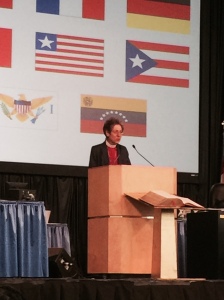 The Presiding Bishop for the Episcopal Church serves for a single nine-year term. There’s disagreement on what her job currently is, and much debate on what it should be. She is not infallible like a pope, and can’t veto like a president. In some ways she is more of a spiritual advisor and figurehead, in other ways she is the CEO and chief administrator.
The Presiding Bishop for the Episcopal Church serves for a single nine-year term. There’s disagreement on what her job currently is, and much debate on what it should be. She is not infallible like a pope, and can’t veto like a president. In some ways she is more of a spiritual advisor and figurehead, in other ways she is the CEO and chief administrator.
Today was the first time the House of Deputies was given a chance to meet and learn about the candidates prior to the vote in the House of Bishops. There were bios and intro videos released ahead of time, and today we saw additional “homemade” videos, heard intro speeches, and listened to the candidates answer questions – A LOT of questions. The questions were submitted by church members ahead of time and separated out into categories such as structure, theology, LGBT issues, etc. The bishops took turns pulling questions out of a bowl and giving short, off-the-cuff answers. Over the course of three hours, we got to know a bit more about the candidates and how they might lead the church.
The environment surrounding the election of a Presiding Bishop is delicate and strange. On one side it’s a typical election where candidates are nominated and must prove their worth to a group of voters who then decide who should get the job. On the other hand it’s supposed to be a calling, not a career move. This subtlety is reflected in the language we use. The nominees aren’t “running” for Presiding Bishop, they are standing for election. They are making themselves willing and available, not vying for the job.
This tension was certainly present in the opening speeches and many of the answers. I couldn’t help but think of the Miss America competition. The questions ranged from the simple and easy (“How has your prayer life changed?”) to the nearly impossible (“How do you feel about divestment in Israeli companies?”). Just like with Miss America, the candidates must craft an answer that means all things to all people. Nothing too upsetting, nothing too generic. To their credit, the nominees were a lot more willing to jump into specifics than most beauty contestants, but then again their audience is a bit more forgiving and their answers aren’t on YouTube.
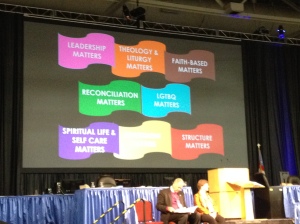 After about an hour I leaned over to the deputy next to me and said, “You know if they weren’t all trying to become Presiding Bishop, I might really enjoy this.” If they felt a bit freer with their answers and if the questions were a bit more open, the basic activity would have been really wonderful. Imagine if part of every General Convention involved us putting a small group of well-spoken bishops and other leaders on the stage and asking them to reflect on the issues surrounding the church. How much might we learn – and how much might we change – if they speak and we listen and no one has an agenda?
After about an hour I leaned over to the deputy next to me and said, “You know if they weren’t all trying to become Presiding Bishop, I might really enjoy this.” If they felt a bit freer with their answers and if the questions were a bit more open, the basic activity would have been really wonderful. Imagine if part of every General Convention involved us putting a small group of well-spoken bishops and other leaders on the stage and asking them to reflect on the issues surrounding the church. How much might we learn – and how much might we change – if they speak and we listen and no one has an agenda?
While I think the session was well organized and I appreciate all the work that went in to getting the House of Deputies more involved in the process, I couldn’t help but ask, “What am I doing here?” The laws of the church dictate that it is the House of Bishops that elects their presider. All the House of Deputies does is confirm the election (a good and reasonable guard against a totalitarian takeover). There are plenty who think this should be changed, but I’m not one of them. The House of Bishops meets way more often, they are a smaller and more intimate body, and they have consistency of membership. The House of Deputies is huge, meets once every three years, and is about 40%-50% brand new people. We don’t know these bishops like they know each other, and we certainly aren’t any more qualified than they are to make a decision based on available information. So unless I suspect foul play, I see no reason not to trust their judgement and confirm whomever they call. If we can’t trust them enough for that, why did we elect them in the first place?
Before today, all I knew was the four names and I felt generally ambivalent about all of them. I was confident that the committee we elected was able to find four candidates that would all do a fine job. I didn’t really care who won. Now I know a bit more about each of them, and while I wasn’t really trying, I can’t help but have a favorite. But I still don’t have a vote. So all I have gained is the possibility to be disappointed when the guy I want isn’t picked.
I worry what will happen if we acquiesce to present paranoia and make the change suggested by TREC to have the Presiding Bishop elected by both houses. I worry that the politicking will go up, that we will have to suffer through actual campaigns, and that the job will always end up going to the person who wants it the most (which is almost never the best person for a leadership role).
The vote happens on Saturday in a closed session of the House of Bishops. No white smoke will go up. Instead a simple a message will be sent to the House of Deputies and a bit of (possibly unnecessary) bureaucratic process will occur before the vote comes before the house. And I’m voting yes. I don’t normally decide my votes ahead of time, but unless some strange and terrible thing is revealed about the candidates between now and then, I’m voting to confirm whichever person they choose. And why shouldn’t I? I respect and trust the bishops. If I didn’t, I wouldn’t still be in a church named after them.
Preliminaries: What Are You Leaving Behind?
Between getting my registration badge and finding my committee room, I had a few moments to spare. I walked along the main hallway until I found the sign for the House of Deputies. I flashed my badge to the volunteer guarding the door and headed inside.
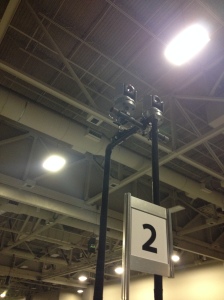 The room was huge. It always is. The House of Deputies is routinely housed in the biggest room a convention center has. The ceiling reaches up high above you, and there’s real distance between the door and the curtains that mark off the legislative space. The dim fluorescent lights were familiar. The cement floors were familiar. The rooms where we work tend to be rather cold and sterile spaces. But that’s because they usually don’t have a soundtrack.
The room was huge. It always is. The House of Deputies is routinely housed in the biggest room a convention center has. The ceiling reaches up high above you, and there’s real distance between the door and the curtains that mark off the legislative space. The dim fluorescent lights were familiar. The cement floors were familiar. The rooms where we work tend to be rather cold and sterile spaces. But that’s because they usually don’t have a soundtrack.
As soon as I stepped through the door I heard them. An a cappella chorus of women singing high, sweet notes was playing loudly over the speakers. If they were singing words, they were singing the same words over and over. Da de Da, Da de Da. The song shifted and I thought I heard some distinctly African syllables. Harmonies and breath swallowed the space. The music was loud and thank the Lord for that. It echoed against the giant bare walls and turned the room from a hospital into a holy place.
Up on the jumbo screens the techs were running tests. White Balance. Gain. Hue. Check. A man held a white sheet up at the podium to test the coloring of the cameras. A woman joined him and they discussed camera height. The women sang on.
I found the table for our diocese, clean and clear and free from the debris that would inevitably fill it. I took a few pictures of the big empty house, as is my custom. I like how the place looks as it sits in preparation. I took a deep breath. The women sang. Here we go again.
_______________________________________
“How many people have told you that you look like Stanley Tucci?” I asked Brian Baker, Deputy chair of the Special Legislative Committee on Marriage.
He laughed in the tired way I laugh when people attempt to make Hurricane Katrina jokes. “You’re the third today,” he said with a smile of resignation.
Tonight was our first committee meeting, and it was mostly an introduction. Our Bishop chair, the Rt. Rev. Brian Thom, led us through a short mixer to determine demographics. We self-sorted by silly questions such as “What color is your toothbrush?” and serious ones such as “Are you a cancer survivor?” Some answers were surprising. Despite the typical assumption about the Episcopal Church (and General Convention specifically) being a very old group, most still had two surviving parents and very few had grandkids. For me the biggest take away was from the question about marriage. All but three or four of us have been married, and about half who have been married have also been divorced.
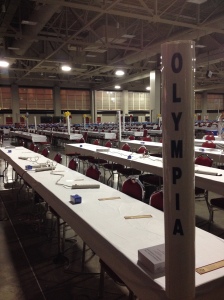 After our mixer, Brian asked us each of us to share what we were having to leave behind in order to do the work we have come to do. He explained that his son is about to go off to school, and it’s hard to be gone for two of the last three weeks that his son is living under their roof. Many of the members were leaving behind similar situations of children moving away. Several had sick spouses at home, some sick enough to be in the hospital. There were challenges at work and at churches that members felt guilty for leaving, feeling as though they’d abandoned others to do the difficult work. One woman recently lost her father, another was power of attorney over a very sick friend. Several will be missing wedding anniversaries, and one just got through a divorce. One South Carolina bishop lamented not being with his diocese during a time of mourning. “There are demonstrations going on across the street from our cathedral,” he said, “And I can’t be there with them.”
After our mixer, Brian asked us each of us to share what we were having to leave behind in order to do the work we have come to do. He explained that his son is about to go off to school, and it’s hard to be gone for two of the last three weeks that his son is living under their roof. Many of the members were leaving behind similar situations of children moving away. Several had sick spouses at home, some sick enough to be in the hospital. There were challenges at work and at churches that members felt guilty for leaving, feeling as though they’d abandoned others to do the difficult work. One woman recently lost her father, another was power of attorney over a very sick friend. Several will be missing wedding anniversaries, and one just got through a divorce. One South Carolina bishop lamented not being with his diocese during a time of mourning. “There are demonstrations going on across the street from our cathedral,” he said, “And I can’t be there with them.”
We heard a short presentation on the recent history of same-sex and same-gender relationships in the church from a member of the Task Force on the Study of Marriage. She highlighted just how much has changed in the last triennium. For example when the committee was first formed, only six states had legalized gay marriage. Now it’s thirty-six. She reminded us that no one piece of legislation is likely to be enough to resolve this issue. No one thing will make or break us. It’s a good reminder: what we are talking about is much bigger than the words we’ll use to discuss it.
In closing, Bishop Thom reminded us that we are all here not by our doing, but by the Spirit’s. “The Spirit has an idea for you,” he said. For us on the committee, for the dozen guests sitting in the gallery. She brought us here and put us in this place for some reason. It is our charge to find out and follow.
Begin Again
So it starts again. Another triennium, another convention, another set of hot-button issues to discuss. If time and internet access allow I’ll do expanded posts on each of these issues before convention starts, but in case it doesn’t happen, here’s the bumper-sticker version:
1) Election of a New Presiding Bishop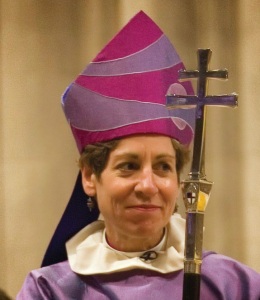
This marks the end of Katharine Jefferts-Schori’s term as Presiding Bishop, and it’s time to elect someone new. The nominations committee has suggested four names (videos of the four candidates can be found here). The fact that there are no women on the list has not gotten past anyone, though the sad fact remains that there are very few women they have to choose from in the pool of qualifying bishops. The fact that three out of four are white has also escaped no one. Once again, small pool.
2) TREC Report and Restructuring
In the wake of the unanimous 2012 decision to create the Task Force for Reimagining the Episcopal Church (TREC), the 2015 Convention will have to deal with the report delivered by the task force. There is no doubt that “dealing with it” will involve completely changing the proposed resolutions in big and small ways. Some of the report’s suggested changes go so far as to suggest switching to a unicameral system and changing the Presiding Bishop’s job description. Responses to the TREC report have been mixed. People have expressed both excitement and concern over specific proposed resolutions, as well as over the general feeling and tone of the work. The bottom line: Did we get what we asked for? More importantly, is what we asked for what we really needed?
3) Marriage Canons
Same-gender marriage in the Episcopal Church seems more inevitable with every convention, but that doesn’t mean the road is easy or the journey fast. There is likely to be more harsh words and hurt feelings as we discuss changing the marriage canons, which currently describe marriage as between a man and a woman. The special marriage committee has returned from their work with suggestions on how to change the canons, but no there are explicit theological statements or suggestions of universal acceptance.
What else should we expect at General Convention? There are a few contenders. I’ve heard talk of changing diocesan assessment (the amount of money each diocese is expected to pay into the larger church). There’s bound to be a few things about climate change and the middle east. A special committee was created to discuss issues around drug and alcohol abuse. Or maybe, just maybe, we’ll sit around for 11 days and just talk about God. Wouldn’t that be something else.